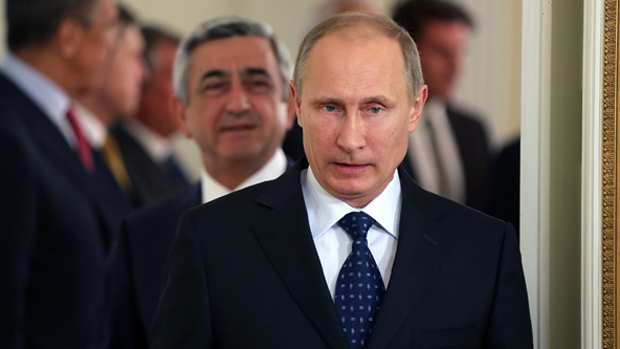Russia sanctions: will tough new measures hurt Putin?
Cameron urges EU to punish Russia for links to separatists – but sanctions will hurt Europe too

A free daily email with the biggest news stories of the day – and the best features from TheWeek.com
You are now subscribed
Your newsletter sign-up was successful
European foreign ministers are meeting in Brussels today to discuss implementing wider sanctions against Russia. The country has faced widespread international condemnation amid accusations that flight MH17 was shot down by Moscow-backed Russian separatists in Donetsk.
What are the sanctions likely to be?
The EU will expand the list of people and businesses who will face sanctions. The measures are expected to target individuals who "materially or financially" support actions that "undermine or threaten Ukraine's sovereignty, territorial integrity and independence", the BBC reports.
The Week
Escape your echo chamber. Get the facts behind the news, plus analysis from multiple perspectives.

Sign up for The Week's Free Newsletters
From our morning news briefing to a weekly Good News Newsletter, get the best of The Week delivered directly to your inbox.
From our morning news briefing to a weekly Good News Newsletter, get the best of The Week delivered directly to your inbox.
Actions that could be taken include asset freezes and travel bans. The extended list is expected to be released by the end of July.
"Phase three" sanctions would go even further and target entire sectors of the Russian economy, especially energy and finance. Such broad economic sanctions would need to be approved by heads of state and cannot be passed at today's meeting. But several EU countries are hoping to "to lay the groundwork for such an escalation", the Financial Times reports.
Who is in favour?
David Cameron has called for "hard-hitting" sanctions against Russia. Cameron is supported by Poland and several Baltic states in his call for stronger action.
A free daily email with the biggest news stories of the day – and the best features from TheWeek.com
Cameron told parliament that "Russia cannot expect to continue enjoying access to European markets, European capital, European knowledge and technical expertise while she fuels conflict in one of Europe’s neighbours", the FT reports.
The US has already implemented tough sanctions against Vladimir Putin's inner circle and Barack Obama said Russia's actions should serve as a "wake-up call for Europe".
Who is opposed?
Cameron said there was a "reluctance" from certain EU leaders to push for more decisive action, mentioning France's valuable military trade with Russia. A French official told the FT that France would continue to honour it contracts with Russia, despite Cameron's calls.
Germany also has strong export links with Russia and is a large importer of the country's oil and gas. German Chancellor Angela Merkel has urged "restraint" in implementing sanctions. The Netherlands and Italy are also heavily reliant on Russian gas.
Will they work? What could the consequences be?
Leaders hope that by implementing economic sanctions, Russia will be forced to de-escalate the fighting in eastern Ukraine by ending its active military and financial support of Russian separatist rebels in the area.
Prime Minister Dmitry Medvedev insisted sanctions would be ineffective and would simply "fuel anti-Western and anti-European sentiment in Russia". Some European governments are wary of potential retaliation from Moscow, Reuters reports.
The BBC's Europe editor Gavin Hewitt warns that targeting Russia's energy exports countries could destabilise the eurozone's fragile recovery.
-
 6 of the world’s most accessible destinations
6 of the world’s most accessible destinationsThe Week Recommends Experience all of Berlin, Singapore and Sydney
-
 How the FCC’s ‘equal time’ rule works
How the FCC’s ‘equal time’ rule worksIn the Spotlight The law is at the heart of the Colbert-CBS conflict
-
 What is the endgame in the DHS shutdown?
What is the endgame in the DHS shutdown?Today’s Big Question Democrats want to rein in ICE’s immigration crackdown
-
 Putin’s shadow war
Putin’s shadow warFeature The Kremlin is waging a campaign of sabotage and subversion against Ukraine’s allies in the West
-
 Alexei Navalny and Russia’s history of poisonings
Alexei Navalny and Russia’s history of poisoningsThe Explainer ‘Precise’ and ‘deniable’, the Kremlin’s use of poison to silence critics has become a ’geopolitical signature flourish’
-
 What happens now that the US-Russia nuclear treaty is expiring?
What happens now that the US-Russia nuclear treaty is expiring?TODAY’S BIG QUESTION Weapons experts worry that the end of the New START treaty marks the beginning of a 21st-century atomic arms race
-
 Epstein files topple law CEO, roil UK government
Epstein files topple law CEO, roil UK governmentSpeed Read Peter Mandelson, Britain’s former ambassador to the US, is caught up in the scandal
-
 Iran and US prepare to meet after skirmishes
Iran and US prepare to meet after skirmishesSpeed Read The incident comes amid heightened tensions in the Middle East
-
 Grok in the crosshairs as EU launches deepfake porn probe
Grok in the crosshairs as EU launches deepfake porn probeIN THE SPOTLIGHT The European Union has officially begun investigating Elon Musk’s proprietary AI, as regulators zero in on Grok’s porn problem and its impact continent-wide
-
 Israel retrieves final hostage’s body from Gaza
Israel retrieves final hostage’s body from GazaSpeed Read The 24-year-old police officer was killed during the initial Hamas attack
-
 China’s Xi targets top general in growing purge
China’s Xi targets top general in growing purgeSpeed Read Zhang Youxia is being investigated over ‘grave violations’ of the law